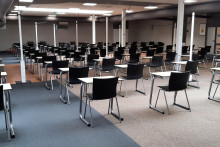Misconduct is not allowed at the UT. In case a student submits unoriginal work or cheats during an examination they might face consequences ranging from dismissed grades to expulsion. However, despite the risks, some students choose to take the chance. ‘Before the exam, I write my code in small pieces of paper and hide it in my pocket or pencil case’, says Computer Science student Luc*. ‘During the exam, I choose a seat towards the end of the room, and I calmly make use of the notes.’
The students also seem to take advantage of the freedom they get during exams. Lisa, a Psychology student, states: ‘Cheating during exams is difficult for us, but we make use of loopholes, such as being allowed to use a dictionary or going to the restroom.’ A Computer Science student, Anna, and a Psychology student, Carina verify these claims. ‘It is stressful to basically cheat behind the examiner’s back and in front of other students, so I always go to the toilet and use my phone’, says Anna. ‘Normally I write definitions or formulas in my dictionary, thankfully the examiners never notice them’, Carina explains.
Freedom
As for whether the students have more freedom than they should, we asked Pieter-Tjerk de Boer, an associate professor at the EEMCS faculty. De Boer used to be a member of the examination board for Computer Science at the UT, and he handled an exam fraud case in 2020, where more than 20% of students cheated during a remote Computer Science exam. Would less freedom prevent cheating, according to him? 'Well, it depends. For example, at an open book exam there's not much to gain by cheating. And we could perhaps watch the students more carefully, but there are limits; you can't forbid toilet visits.’
As for using the phone while using the restroom, De Boer states that it is forbidden for students, and they are required to leave it on the examiner’s desk. ‘Sometimes when the students go to the toilet, they take their phone out of their pocket and put it on my desk, but other times they don’t. And even among those who do, I can't guarantee they won't bring a second phone.’ It is impossible to control everything and as De Boer says, ‘It is hard to prevent this behaviour.’
Copying Assignments
All students interviewed admit having copied assignments from fellow students at least twice this year. Computer Science student Max explains that copying assignments is very easy. ‘I use assignments that are shared by second-year students. I just change the structure or the writing style and voila, it becomes mine.’ In general, according to all six individuals the easiest way to copy another student’s work is simply by changing the appearance of an assignment and paraphrasing the content.
De Boer supports that reviewing another student’s work can be helpful in case of e.g. a master thesis, to see how a thesis is structured and so on. ‘But for smaller assignments in courses, though you may learn from discussing it with another student, it should not go so far as using their work as a basis for yours’, he explains. This can be seen in the case of Kasper and Lisa who are Psychology students, and they admit having received more extensive assistance when completing assignments. ‘I finish assignments with the help of my friends and although it sounds innocent, this is not always allowed’, Lisa states. Kasper explains another case where he finished almost no assignments by himself, ‘Last year, when I was a freshman, my girlfriend was a third-year Psychology student. At the time she wrote all my essays and reports.’ He adds: ‘As you would expect, my grades were very high.’
Ethical dilemmas and consequences
All six young people being interviewed believe that cheating is a result of high expectations and lack of time. Kasper explains his reasons of cheating. ‘I do not cheat because I like to, but because I prefer to spend my free time with friends rather than study all day long.’ Sometimes parents can be strict, such as in the case of Anna who argues by saying, ‘my parents expect me to pass everything, and getting good grades based on my own effort is not always feasible’.
De Boer thinks there are several reasons why student might cheat. ‘Sometimes the assignment can be too difficult, or the student is just lazy, and it is easier to copy it from someone else.’ He also explains the main consequences when not working by yourself and depending on copying your assignments from others. ‘If as a teacher I did not think that these assignments are useful, then I wouldn’t prescribe them. Doing these assignments, is a way of learning, getting beyond the theory and mastering skills.’
As for the repercussions, De Boer is very clear. ‘Don’t do fraud is easy to say, but there is a good chance that you will be caught, which can cause a lot of trouble and a lot of stress. Cheating is really not worth the risk. If you get caught, you will first have a stressful time waiting for the examination board's decision, and then have to do extra work, and may even be expelled from your study program, temporarily or permanently.’
* While the students mentioned in this article chose to remain anonymous, their identities are known to U-Today. For the sake of this article, fictious names were used.







